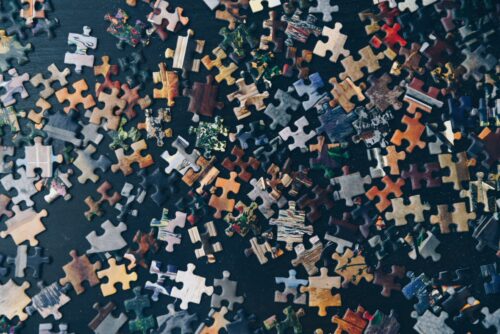Fears of contracting coronavirus coupled with strict shelter-at-home measures are causing all of us to be stressed. Studies show adults and children have elevated anxiety levels over the past two months.
But researchers have discovered something simple can help reduce the impact of COVID-19 on our emotional well-being: Solving puzzles appears to distract us and help us feel more positive amid this ever-evolving pandemic.
Why? Puzzles, which trace their origins back to the 1700s when they were created as an educational tool for children, gained mainstream popularity among adults during the Great Depression. Cheap and easy to assemble, they can fill what seems like endless days and nights. They require patience until the final piece is placed, helping engage our brain and triggering a response that can help with mental health.
“When you think about puzzles from the neuroscience perspective and what is going on in the brain, puzzles pack a big punch,” Nicole Calakos, a professor of neurology and neurobiology at Duke University, said in an interview.
One study at Drexel University in Philadelphia suggested difficult tasks and games prompt the brain to produce a reward signal. This happens when we get close to completing the game or reaching that a-ha moment.
“If it was successful and it was a good outcome, dopamine gets sent out,” Calakos said. “That’s a little bit like a pat on the back ‘good job.’ We all love that.”
Puzzles, including crosswords, Sudoku or some video games, require a level of focus and attention that could lead to mindfulness. They also help us feel a sense of control among something routine.
“Right now, we are all struggling with being out of our routines and all of the other new worries and uncertainties,” Calakos said. “So we have a lot of stress rattling around, and I think, at a very high level, puzzles are engaging us and giving us an escape from this.”
According to the Centers for Disease Control and Prevention, stress is having an unpredictable effect on folks during this pandemic. Some of us have experienced disruptions in our sleep (hello unsettling nightmares!) or eating patterns, worsened chronic health conditions or increased mental health problems.
Age and illness also play a role in how COVID-19 exacerbates stress and anxiety. The CDC found children, teens, older adults, those who suffer chronic diseases and people with substance abuse issues are more likely to feel the impacts of the pandemic on mental health.
Front-line workers, health-care providers, first responders and other people who work in response to COVID-19 also report a higher risk of feeling more stressed.
Since puzzles also tout health benefits that include heading off memory loss, dementia and Alzheimer’s, it only makes sense we engage in an immersive task that pulls us away from the stresses of our new normal.





